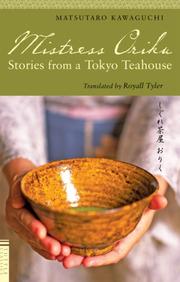| Listing 1 - 3 of 3 |
Sort by
|
Book
ISBN: 9783764387877 3764387874 3034609582 Year: 2012 Publisher: Basel : Birkhäuser,
Abstract | Keywords | Export | Availability | Bookmark
 Loading...
Loading...Choose an application
- Reference Manager
- EndNote
- RefWorks (Direct export to RefWorks)
Der international renommierte japanische Architekt Kengo Kuma hat für den Park des Museums für Angewandte Kunst in Frankfurt am Main ein vollkommen neuartiges Teehaus entwickelt: eine luftgetragene Form. Durch ein Kompressorsystem aktiviert, erwächst das Teehaus wie eine Blüte aus dem semitransparenten High Tech-Material GORE-Tenara, im Inneren finden Tatami-Matten, ein elektrisch beheizbarer Herd für den Wasserkessel, eine Tokonoma Nische und ein Vorbereitungsraum Platz. Die doppelwandige Hülle mit inneren Koppelseilen erzeugt eine golfballähnliche Membrantextur und macht zudem eine Luftschleuse überflüssig. Eine integrierte LED-Technik lässt das Teehaus im Dunklen sanft, fast mythisch, erstrahlen. Dieses jüngste Projekt Kumas ist ein Symbol für die traditionsbewusste Modernität des heutigen Japans und seiner Architektur, aber auch ein richtungsweisendes Beispiel temporären und mobilen Bauens, das nur Dank einer ungewöhnlich dichten internationalen Kooperation zwischen Architekten, Ingenieuren und Unternehmen realisiert werden konnte. Das vorliegende Buch entfaltet die technologischen, kulturhistorischen und ästhetischen Aspekte dieser Neuinterpration des japanischen Teehauses. Kengo Kuma s Teahouse is a masterly reinterpretation of a classical Japanese building type. Delivered in August 2007 for the Park of the Frankfurt Museum of Applied Arts (a Richard Meier Building), Kuma s innovative structure in flexible, semi-transparent, breathing Tenara-Membrane - inflated by means of a pneumatic system to a blossom-like form - houses in the interior the classical elements for Japanese tea ceremony. Integrated LED technology allows the use of the teahouse at night; the interior can be heated by way of the membrane. The monograph, including an original text by Kuma himself, gives an in-depth documentation of this lyrical temporary structure - an outstanding example of ephemeral architecture, combining poetry and technology - with many unpublished sketches, technical plans and with splendid colour photographs.
Tearooms --- Kuma, Kengo, --- MAK Frankfurt. --- Tea houses (Restaurants) --- Tea rooms --- Tea shops --- Teahouses (Restaurants) --- Teashops --- Restaurants --- 隈研吾 --- Museum Angewandte Kunst Frankfurt am Main --- Museum für Angewandte Kunst Frankfurt am Main --- Furankufuruto Kōgei Bijutsukan --- Museum of Applied Arts (Frankfurt am Main, Germany) --- Museum für Kunsthandwerk Frankfurt am Main
Book
ISBN: 1501715550 1501715542 1501715488 1501715496 9781501715549 9781501715556 9781501715488 9781501715495 Year: 2018 Publisher: Ithaca
Abstract | Keywords | Export | Availability | Bookmark
 Loading...
Loading...Choose an application
- Reference Manager
- EndNote
- RefWorks (Direct export to RefWorks)
To understand a city fully, writes Di Wang, we must observe its most basic units of social life. In The Teahouse under Socialism, Wang does just that, arguing that the teahouses of Chengdu, the capital of Sichuan Province, are some of the most important public spaces-perfect sites for examining the social and economic activities of everyday Chinese. Wang looks at the transformation of these teahouses from private businesses to collective ownership and how state policy and the proprietors' response to it changed the overall economic and social structure of the city. He uses this transformation to illuminate broader trends in China's urban public life from 1950 through the end of the Cultural Revolution and into the post-Mao reform era. In doing so, The Teahouse under Socialism charts the fluctuations in fortune of this ancient cultural institution and analyzes how it survived, and even thrived, under bleak conditions. Throughout, Wang asks such questions as: Why and how did state power intervene in the operation of small businesses? How was "socialist entertainment" established in a local society? How did the well-known waves of political contestation and struggle in China change Chengdu's teahouses and public life? In the end, Wang argues, the answers to such questions enhance our understanding of public life and political culture in the Communist state.
Socialism and culture --- Tearooms --- Tea houses (Restaurants) --- Tea rooms --- Tea shops --- Teahouses (Restaurants) --- Teashops --- Restaurants --- Culture and socialism --- Culture --- History --- Chengdu (China) --- 成都 (China) --- Chengtu, China --- Tschengtu (China) --- Chʻeng-tu (China) --- Chʻeng-tu-shih (China) --- Hua-yang (China) --- Chengdu Shi (China) --- Chʻeng-tu-hsien (China) --- Politics and government --- Social life and customs --- China Chinese. --- 成都市(China) --- Chʻeng-tu shih (China) --- Khreng-tuʼu (China)

ISBN: 0804838429 9780804838429 4805308869 9784805308868 Year: 2005 Publisher: Rutland Tuttle
Abstract | Keywords | Export | Availability | Bookmark
 Loading...
Loading...Choose an application
- Reference Manager
- EndNote
- RefWorks (Direct export to RefWorks)
Tearooms --- Tokyo (Japan) --- Japan --- Social life and customs --- J5933 --- Japan: Literature -- modern fiction and prose by individual authors (1868- ) --- Fiction. --- Tea houses (Restaurants) --- Tea rooms --- Tea shops --- Teahouses (Restaurants) --- Teashops --- Restaurants --- Tokyo (Japan : Prefecture) --- Tokyo Metropolitan Government (Japan) --- Tonggyŏng (Japan) --- Tokio (Japan) --- Tʻokʻyoo (Japan) --- Tung-ching tu (Japan) --- Tung-ching tu tʻing (Japan) --- Tōkyō-shi (Japan) --- Tung-ching (Japan) --- Dongjing (Japan) --- 東京 (Japan) --- Tokyo Metropolis (Japan) --- 東京都 (Japan) --- Tōkyō-to (Japan) --- طوكيو (Japan) --- Ṭūkiyū (Japan) --- Горад Токіа (Japan) --- Horad Tokia (Japan) --- Токіа (Japan) --- Tokia (Japan) --- Токио (Japan) --- Edo (Japan) --- Shinagawa-ken (Japan) --- Tokyo (Japan : Fu) --- 동경 (Japan) --- Dongjing du (Japan) --- Dongjing du ting (Japan) --- 东京 (Japan) --- Toukio (Japan) --- Tearooms - Japan - Fiction --- Tokyo (Japan) - Social life and customs - Fiction --- Japan - Social life and customs - Fiction
| Listing 1 - 3 of 3 |
Sort by
|

 Search
Search Feedback
Feedback About
About Help
Help News
News